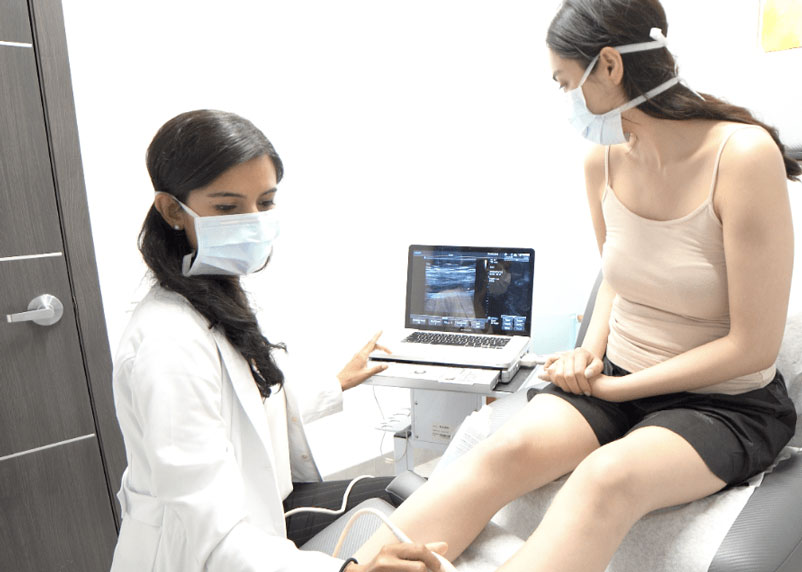What is a vascular surgeon called?
The official terminology for a vascular surgeon is a “phlebologist,” i.e., a physician specializing in the diagnosis and treatment of vascular conditions, such as spider veins, varicose veins, leg pain, leg cramps, and restless leg syndrome. But phlebologists are colloquially known as vein doctors, vein specialists, vascular doctors, vascular surgeons, and vein physicians. If you have spider veins, varicose veins, or other vein-related conditions, please look for vein doctors.

Vein Treatment Clinic is led by some of the country’s leading board-certified vein doctors. We individually select vein doctors from the country’s leading medical schools, residencies, and fellowships programs. Furthermore, we only select physicians with specialized training in vascular imaging and the latest minimally invasive procedures. Our vein doctors also undergo board certification to establish themselves as the leading experts in phlebology.
If you’re looking for vascular surgeons, please contact our vein doctors in New York, New Jersey, California, Long Island, and Washington DC. If you’re in or around the DC Metro Area, you can find our vein specialists in Bethesda, Maryland. We have multiple state-of-the-art vein treatment clinics across the country, all led by highly-skilled, fellowship-trained vein doctors. Please schedule an appointment with your nearest vein doctor today.

Is a vascular doctor the same as a cardiologist?
A vascular doctor isn’t the same as a cardiologist. A vascular doctor or phlebologist deals with the diagnosis and treatment of vascular conditions that affect blood circulation in the veins, such as spider veins, varicose veins, and vein disease. Meanwhile, a cardiologist deals with cardiovascular conditions related to the heart. Cardiologists generally have knowledge of the vascular system as well, but phlebologists don’t necessarily specialize in heart conditions.
When looking for a vascular doctor, you must consider the fields in which they’ve specialized. The ideal vein doctors must have completed residency programs or fellowships in subjects related to vein care, such as vascular imaging and endovenous procedures, such as radiofrequency ablation, laser ablation, and ambulatory phlebectomy. The barrier to entry into phlebology is fairly low, so you must look for vein experts carefully.
What does a vascular surgeon deal with?
Vascular surgeons and phlebologists deal with the identification, diagnosis, and treatment of vascular conditions, such as spider veins, varicose veins, leg swelling, restless leg syndrome, leg cramps, chronic venous insufficiency, and deep vein thrombosis. They use cutting-edge diagnostic tools, such as duplex ultrasound, to visualize the blood flow in your leg veins and curate a personalized, minimally invasive vein treatment plan.
What is the most common vascular disease?
Peripheral arterial disease and chronic venous insufficiency are the most common vascular diseases. Peripheral arterial disease is a condition wherein the accumulation of fatty deposits can block the arteries, and chronic venous insufficiency is a circulatory disorder that affects the veins. Chronic venous insufficiency is a highly underdiagnosed medical condition because its symptoms are often mistaken as signs of aging.
Chronic venous insufficiency is a circulatory disorder caused by the collapse of vein valves. When your vein valves collapse or malfunction, blood flows backward due to gravity and accumulates in the leg veins. The continued accumulation of blood in leg veins is responsible for a wide range of vascular conditions, including spider veins, varicose veins, leg heaviness, restless leg syndrome, leg cramps, leg ulcers, and deep vein thrombosis.
What are the symptoms of chronic venous insufficiency?
The initial signs and symptoms of vein disease are fairly mild and benign, such as leg heaviness, leg pain, leg swelling, restless leg syndrome, and leg cramps. Most people misattribute these signs and symptoms of aging or exhaustion. A clear sign that these symptoms are caused by vein disease is that they worsen at the end of the day or after long periods of sitting or standing still. That’s because the symptoms of vein disease worsen when blood accumulates in the leg veins, which happens when you sit or stand still.
Spider veins and varicose veins are the earliest visible symptoms of vein disease. The continued accumulation of blood in leg veins can damage your blood vessels and make them protrude outwards. Varicose veins are an undisputed sign of chronic venous insufficiency. If the condition is left untreated, you may eventually suffer from leg swelling, skin discoloration, leg ulceration, and deep vein thrombosis (blood clots in leg veins). If the blood clots break, they may also travel to the lungs and cause a pulmonary embolism.
How can I prevent vein disease?
There are no definite means of preventing vein disease. You may develop chronic venous insufficiency for a wide range of risk factors, such as genetics, pregnancy, hormonal changes, aging, being overweight, and certain occupations. While you can’t prevent vein disease completely, you can minimize the risk of vein disease with a few lifestyle changes:
- Wear compression stockings regularly
- Exercise regularly — running, swimming, cycling, and yoga are ideal
- Elevate your legs above your heart’s level while sitting down
- Lose weight if you’re suffering from obesity
- Don’t sit or stand still for long periods of time
What are the best minimally invasive vein treatments?
Some of the best minimally invasive vein treatments include endovenous ablation, venaseal, sclerotherapy, and ambulatory phlebectomy. Endovenous ablation and venaseal involve using thermal energy, laser energy, or medical adhesives to collapse the diseased saphenous vein responsible for your vein problems (chronic venous insufficiency).
Ambulatory phlebectomy involves the physical extraction of unwanted varicose veins through small incisions on the skin’s surface. And sclerotherapy involves injecting a sclerosant medicine into spider veins to turn them into hardened scar tissues eventually absorbed by the body. Our vein doctors will select the ideal minimally invasive vein treatments for you.








